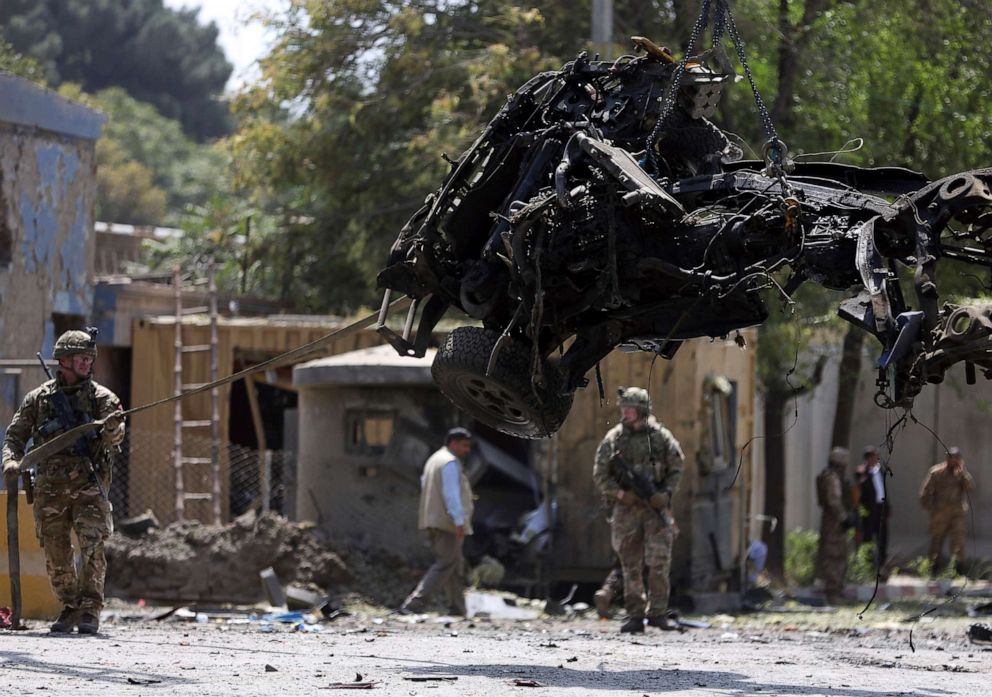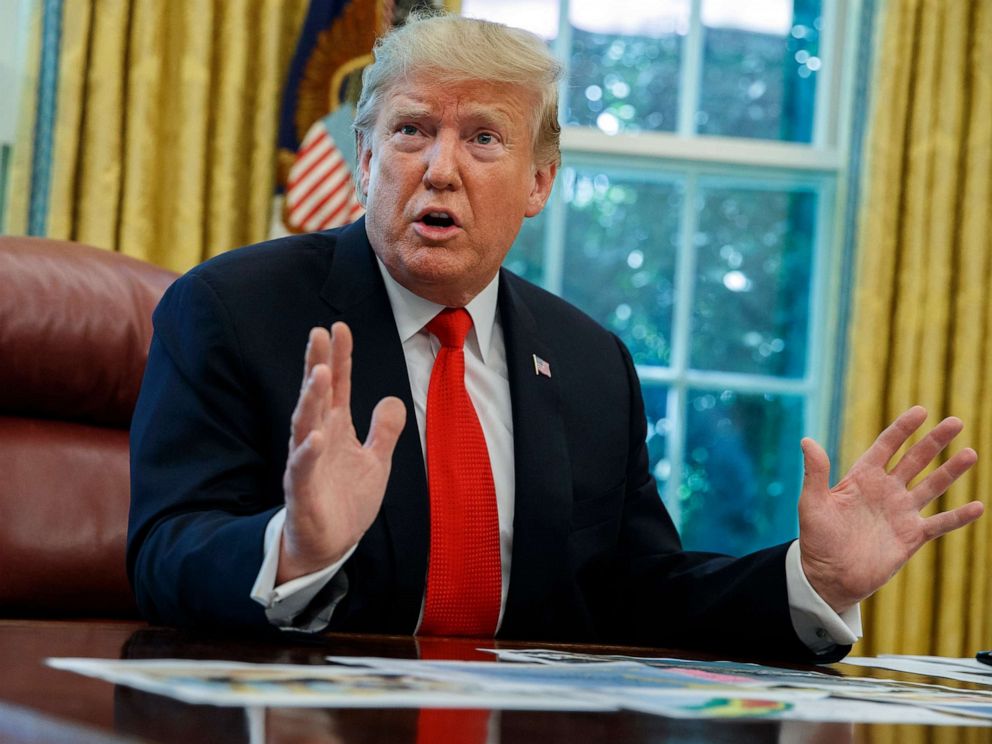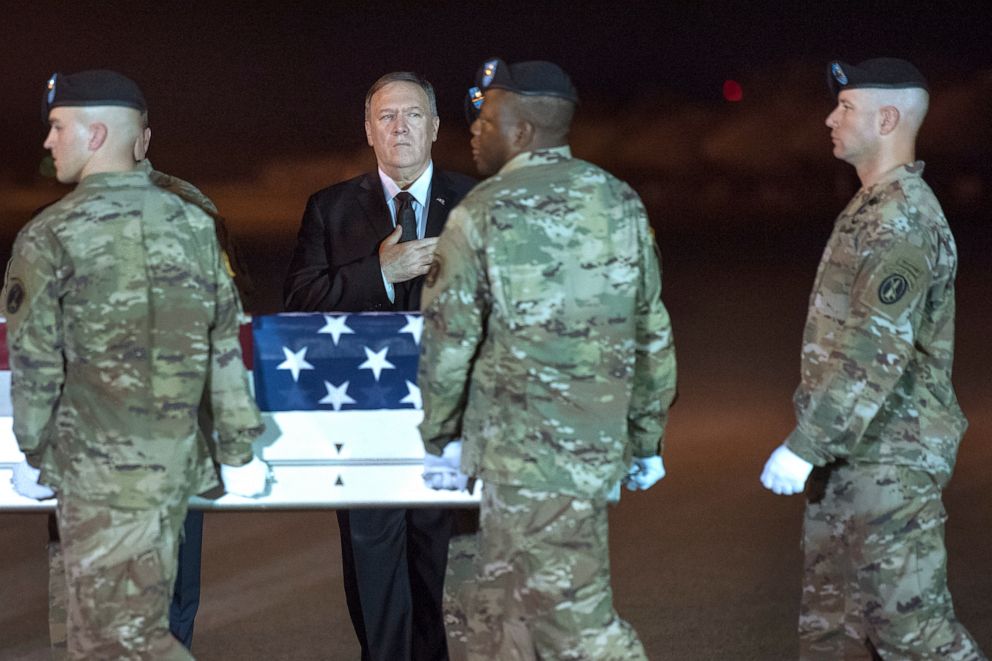Trump cancels secret meeting with the Taliban at Camp David after deadly bombings
The meeting would have been a major breakthrough in the peace negotiations. .
President Trump announced he cancelled secret talks with the Taliban at Camp David on Sunday after the group claimed responsibility for a deadly attack in Afghanistan this week that killed 12, including a U.S. service member.
In a surprise series of tweets on Saturday evening, the president said he called off ongoing peace negotiations with the militant group that would have potentially brought an end to the 18-year war with Afghanistan, the longest in American history.
The president said Taliban leaders were traveling to the United States for the meeting when he decided to call off the talks. He said he also cancelled a separate meeting with the president of Afghanistan, Ashraf Ghani.

"Unbeknownst to almost everyone, the major Taliban leaders and, separately, the President of Afghanistan, were going to secretly meet with me at Camp David on Sunday. They were coming to the United States tonight," Trump tweeted.
"Unfortunately, in order to build false leverage, they admitted to an attack in Kabul that killed one of our great great soldiers, and 11 other people. I immediately cancelled the meeting and called off peace negotiations. What kind of people would kill so many in order to seemingly strengthen their bargaining position? They didn’t, they only made it worse!" Trump tweeted.
"If they cannot agree to a ceasefire during these very important peace talks, and would even kill 12 innocent people, then they probably don’t have the power to negotiate a meaningful agreement anyway. How many more decades are they willing to fight?" he added.
The meeting, which was kept under wraps by U.S. officials, would have been a major breakthrough in the ongoing peace negotiations between the United States, Afghanistan and the Taliban. It also would have been a diplomatic spectacle, with Trump, who views himself as a masterful negotiator, securing a peace deal while sitting across the table with leaders from a militant group.

The president decided to host the meeting at Camp David after a session a week ago at the White House with national security advisers, an administration official said. The peace deal was reaching the final stretch of negotiations, but the president took issue with certain aspects of it and wanted to play a role in the negotiations himself.
News of the meeting's cancellation comes as the United States' top peace negotiator, Zalmay Khalilzad ,traveled to Doha, Qatar, last week to meet with Taliban leaders. Khalilzad had been updating the president's national security adviser, John Bolton, on progress.
Now, with the president's announcement, however, it's unclear where the discussions stand. The clock seems to be ticking on any U.S.-Taliban deal, with Afghan national elections scheduled for Sept. 28.
Neither the State Department nor the National Security Council provided comment on Saturday night.
When asked if this signals the end of peace talks, Secretary of State Mike Pompeo said on "This Week with George Stephanopoulos" that for now, Khalilzad would be "coming home."
Pompeo said the Taliban had agreed to reduce violence, but then the group "overreached" when they killed an American. Still, he acknowledged that attacks on the Taliban and Americans have been going on throughout the peace talks.
In the last 10 days alone, Pompeo said, U.S. forces have killed more than 1,000 members of the Taliban.
"We finally reached a point where we were close, we made real progress, and then the Taliban failed to live up to its series of commitments," Pompeo said. "When that happened, President Trump said, 'I'm not going to take that deal, I'm not going to work with someone that can't deliver on their commitments.' Because in the end ... a deal is just a piece of paper. We actually have to see that change in behavior."
In a statement, the Taliban said following "fruitful talks" an agreement was finalized. They believed the American delegation was happy about the outcome until yesterday.
"Both sides were preparing for the announcement and the signing of the agreement," the Taliban said in a translated statement.
"Now that U.S. President Trump has announced the suspension of negotiations with the Islamic Emirate, this would not harm anyone else but the Americans themselves. This will further harm their credibility and will show and will their anti-peace stance in more clear way," the Taliban said in a statement.

The president tweeted the insurgent group's continued violence during negotiations -- most recently with a suicide attack in Kabul that killed a U.S. soldier -- prompted his decision.
The Pentagon said that Sgt. 1st Class Elis Angel Barreto Ortiz, 34, was killed in Thursday's car bomb attack in Kabul. His remains were transferred to Dover Air Force base late Saturday night with Sec. of State Mike Pompeo, Ryan McCarthy, the Acting Secretary of the Army, and Gen. Joseph Martin, and Vice Chief of Staff to the Army present for the ceremony.
But recently, Pompeo said the recent surge of violence in Afghanistan was reason for peace talks to continue -- and not be scuttled.
"I think this drives home the need for us to be successful, right. The mission set that we’ve undertaken in Afghanistan is a reconciliation to reduce the level of violence, to reduce the level of risk to Afghans, broadly, and the risk to American service members. So I think what you’ll see is a continued push by the United States to achieve the reconciliation," Pompeo said.
The meeting also would have come the same week as the anniversary of the September 11 attacks in 2001 that launched U.S. military involvement in Afghanistan, where around 14,000 American troops are currently stationed. The president has pledged to bring troops home from Afghanistan, and, according to an administration official, has not ruled out the possibility that he will still try to fulfill his commitment to reduce troop presence to 8,600 without signing any kind of deal with the Taliban.
The president's decision to host the potential talks at Camp David was met with criticism by some Republican lawmakers, who questioned why the militant leaders would be allowed to enter the country, let alone meet with a U.S. president at his retreat outside of Washington.
Rep. Adam Kinzinger, R-Illinois, who serves in the Army National Guard, tweeted, "Never should leaders of a terrorist organization that hasn’t renounced 9/11 and continues in evil be allowed in our great country. NEVER. Full stop."
"Camp David is where America’s leaders met to plan our response after al Qaeda, supported by the Taliban, killed 3000 Americans on 9/11," Rep. Liz Cheney, R-Wyoming, tweeted. "No member of the Taliban should set foot there. Ever. The Taliban still harbors al Qaeda. The President is right to end the talks."
When asked about the criticism, Pompeo said it comes with the territory.
"In the end if you're going to negotiate peace you're going to have to deal with some pretty bad actors," Pompeo said. "It's an important place where we thought we could convince all the leaders ... to create better conditions on the ground in Afghanistan."
ABC News' Conor Finnegan contributed to this report.




